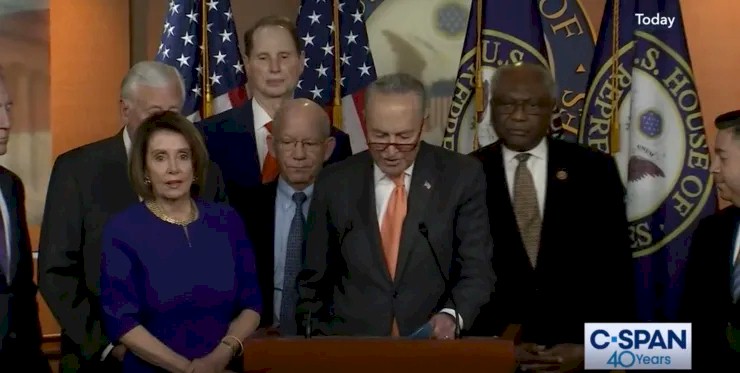Dems Snuck A $15 Minimum Wage Into The CARES Act — And We’ll All Pay The Price
By I&I Editorial
IssuesInsights.com

Buried in a story about the overly generous unemployment “bonus” that Democrats added to the CARES Act is the reason why they insisted on it in the first place — and why it will drag down the recovery once the lockdown ends.
While lawmakers were hammering out the massive $2 trillion bill, a key focus of which was to keep workers connected to their jobs through a loan guarantee program — Democrats insisted on a huge increase in unemployment benefits.
The result was a $600 a week bonus. New York Sen. Chuck Schumer was right to call this “unemployment on steroids.”
Well, guess what?
“The $600 payment aligns with working full time at $15 an hour – the minimum-wage level many Democrats in Congress support,” notes the Wall Street Journal.
The Journal reports that – thanks to this bonus – workers will get an average of $978 in unemployment benefits. What’s more, “Labor Department statistics show half of full-time workers earned $957 or less each week in the first quarter of 2020.”
South Carolina Sen. Lindsey Graham had it exactly right when he said that: “You’re literally incentivizing taking people out of the workforce at a time when we need critical infrastructure supplied with workers. If this is not a drafting error, then it’s the worst idea I’ve seen in a long time.”
And, indeed, this unemployment pay raise contributed to the massive surge in unemployment claims. A Heritage Foundation report published on Wednesday finds that just this one provision will cause almost 14 million more people to file for unemployment benefits than would otherwise be the case,
But the real problem will emerge when state governments start to allow businesses to reopen their doors.
By setting the de facto wage floor at $15 an hour, Democrats will make it harder for companies to lure people back to work who were making less than that.
The Journal provides one prime example:
Tracy Jackson, 50, of Nacogdoches, Texas, started receiving unemployment benefits after losing her job as a cook at a college. Her benefits total $1,200 every two weeks, almost twice what she would earn on the job.
She wants to return to work, but being stuck at home has given her time to reflect. The extra money she receives in unemployment benefits has made her conclude she had been underpaid at her previous job, earning $10.30 an hour after five years.
“I like the college, I really do,” she said. “But they’re going to have to come with more money. If they don’t, I’m not going to be there.”
The story also quotes Joe Sheetz, CEO of the Sheetz convenience store chain, who foresees a big problem of “trying to hire outsiders who are on unemployment … Hard to compete with an extra $600 per week for hourly jobs,” he said.
Magnify this across the country and many businesses – most of the small companies – will start to realize they have two choices: boost pay, or cut back on workers, or both
Either way, the result will be to put the brakes on what otherwise would have been a mad rush to return to work once the economy opens up.
That same Heritage study found that the $600 bonus alone will cut GDP by as much as $1.5 trillion. The study provides state-by-state breakdowns of the impact.
“The primary economic goal in helping to bridge the gap between the previously strong economy and labor market and the forced COVID-19 downturn should be to help keep workers connected to their employers,” the authors write. “The additional $600-per-week unemployment benefit regardless of income level does the opposite.“
This is terrible news. The Commerce Department reports that the economy shrank by 4.8% in the first quarter of this year. Keep in mind that before the lockdowns went into effect in mid-March, Q1 growth was heading toward 3%. The unemployment rate went from 3.5% in February to double digits in April.
The last thing the economy needs is for millions upon millions of workers to stay at home and collect overly generous benefits.
So, the bottom line is that the $600 bonus will likely spur a bout of wage inflation and provide fresh impetus to demands for a $15 an hour federal minimum wage. It will also slow the recovery, which will, in turn, hamper President Donald Trump’s reelection effort.
For Democrats, this is a political win-win. For everybody else who will suffer the consequences, not so much.

